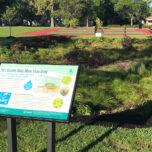December 31, 2019 —  Droughts striking Asia, Africa, the U.S. and elsewhere have meant steep water shortages, while inequities in infrastructure leave some drinking water worldwide unsafe even when it’s technically available. These realities underscore the need to improve water resilience: The water systems we rely on must be able to meet our needs even when faced with dramatic change.
Droughts striking Asia, Africa, the U.S. and elsewhere have meant steep water shortages, while inequities in infrastructure leave some drinking water worldwide unsafe even when it’s technically available. These realities underscore the need to improve water resilience: The water systems we rely on must be able to meet our needs even when faced with dramatic change.
Over the past few years, United Nations reports have noted that making water systems more resilient is “key to maintaining access in a climatically uncertain future” and “much more work is needed” to accomplish this goal. But what should that work be? A new study published in the journal Ecology and Society suggests top priorities should be restoring healthy ecosystems, planning for uncertainty and enhancing our ability to respond to changing circumstances. The study also found strong support among experts for recycling water and diversifying water supply to boost resilience to drought, while working across sectors such as stormwater management and wastewater management to make communities more resilient to flooding.
These findings are based on a survey sent by researchers from the University of British Columbia’s Institute for Resources, Environment and Sustainability to more than 5,000 water researchers, planners, engineers and others. Most of the 420 complete responses were from academic researchers, and the majority were from white men.
Analyzing the survey results, the researchers found that keeping ecosystems healthy was the top priority for experts surveyed. That’s at odds with the conventional laser focus on building or upgrading water infrastructure, and more in line with an eco-hydrological outlook that aims to manage watersheds by connecting environmental benefits to human well-being. Water systems research seldom makes that connection clear.
The strategy respondents rated second most important was to acknowledge the “looming uncertainty” water systems face. As an example, the study points to the unexpected and severe drought that hit Cape Town, South Africa, spurring a water crisis that pushed the city to severely restrict water use. Creating resilient water systems, the study says, will require proactively discussing and dealing with the potential for unanticipated shifts in the water cycle.
Other strategies the experts deemed important included responding quickly to change, being open to institutional change and drawing water from a diverse array of sources.
When asked specifically about building resilience to drought, those surveyed said that diversifying water supply sources — drawing, for example, on surface water, groundwater and recycled water — was the most important tactic. Four in five experts said water recycling was important or very important for resilience to drought. Experts also pointed to conservation as a priority.
To boost resilience to flooding, experts endorsed using an integrated approach in which various sectors work together to develop green infrastructure.
The authors noted that the study focused on the opinions of academic experts, not on the views of people actually managing water systems. Although the research offers one window into available strategies, the future of water resilience will depend on how these strategies are implemented on the ground.
Related Posts
Ensia shares solutions-focused stories free of charge through our online magazine and partner media. That means audiences around the world have ready access to stories that can — and do — help them shape a better future. If you value our work, please show your support today.
Yes, I'll support Ensia!



